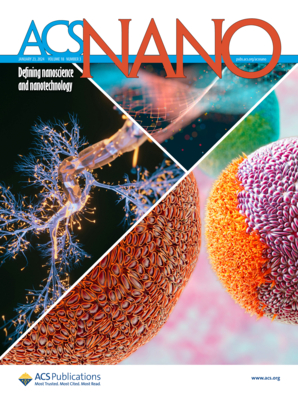Acoustic-Magnetic Responsive Nanomotor Augments Oral Drug Delivery by Gastrointestinal Site Navigation and Mucus Layer Penetration
IF 16
1区 材料科学
Q1 CHEMISTRY, MULTIDISCIPLINARY
引用次数: 0
Abstract
Oral administration is a traditional, safe, and widely used drug delivery strategy. However, the delivery efficiency of the oral drug delivery system is hindered by the long gastrointestinal tract, filled with dense and viscous mucus. Herein, we presented an acoustic-magnetic responsive nanomotor (MMSNP) for oral drug delivery via gastrointestinal site navigation and mucus layer penetration. MMSNP has a Janus rod-shaped structure composed of iron tetroxide and mesoporous silica, which could be guided to various intestinal segments with an external magnetic field based on the demand of different diseases. In addition, the rod-like system could effectively penetrate the dense and viscous mucus under ultrasound radiation to improve the bioavailability of loaded drugs. In diabetes rats, small intestinal navigation and mucus penetration of the nanomotor increased the oral relative bioavailability of metformin (Met) by 78.0% and the effective hypoglycemic time by 1.1-fold than pure Met. In orthotopic colorectal cancer (CRC)-bearing mice, magnetically mediated colorectal navigation increased the anchoring efficiency of nanomotors by 4.2-fold, and ultrasound propulsion increased the mucus penetration efficiency of MMSNP by 5.2-fold, leading to a vastly improved delivery efficiency of cisplatin (CP) and a superior tumor inhibition rate of 97.2%. This simple and versatile nanomotor has broad application prospects in the treatment of gastrointestinal diseases, providing a promising and universal strategy for clinical conversion of orally administered drugs.

声磁响应纳米马达通过胃肠道导航和黏液层穿透增强口服药物给药
口服给药是一种传统的、安全的、广泛使用的给药策略。然而,口服给药系统的给药效率受到胃肠道长,充满密集和粘稠粘液的阻碍。在此,我们提出了一种声磁响应纳米马达(MMSNP),用于通过胃肠道导航和黏液层穿透口服药物。MMSNP具有由四氧化二铁和介孔二氧化硅组成的Janus棒状结构,可以根据不同疾病的需要,在外加磁场的作用下引导到不同的肠段。此外,杆状系统在超声照射下能有效穿透致密粘稠的黏液,提高载药的生物利用度。在糖尿病大鼠中,纳米运动物的小肠导航和黏液渗透使二甲双胍(Met)的口服相对生物利用度比纯Met提高78.0%,有效降糖时间比纯Met提高1.1倍。在原位结直肠癌(CRC)携带小鼠中,磁介导的结直肠导航使纳米马达的锚定效率提高了4.2倍,超声推进使MMSNP的黏液穿透效率提高了5.2倍,从而大大提高了顺铂(CP)的递送效率,肿瘤抑制率达到了97.2%。这种简单、多功能的纳米马达在胃肠道疾病的治疗中具有广阔的应用前景,为口服药物的临床转化提供了一种有前景的通用策略。
本文章由计算机程序翻译,如有差异,请以英文原文为准。
求助全文
约1分钟内获得全文
求助全文
来源期刊

ACS Nano
工程技术-材料科学:综合
CiteScore
26.00
自引率
4.10%
发文量
1627
审稿时长
1.7 months
期刊介绍:
ACS Nano, published monthly, serves as an international forum for comprehensive articles on nanoscience and nanotechnology research at the intersections of chemistry, biology, materials science, physics, and engineering. The journal fosters communication among scientists in these communities, facilitating collaboration, new research opportunities, and advancements through discoveries. ACS Nano covers synthesis, assembly, characterization, theory, and simulation of nanostructures, nanobiotechnology, nanofabrication, methods and tools for nanoscience and nanotechnology, and self- and directed-assembly. Alongside original research articles, it offers thorough reviews, perspectives on cutting-edge research, and discussions envisioning the future of nanoscience and nanotechnology.
 求助内容:
求助内容: 应助结果提醒方式:
应助结果提醒方式:


